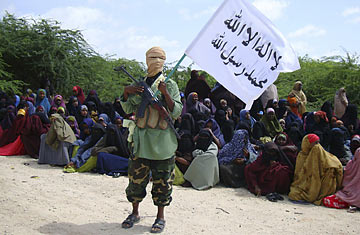
An al-Shabaab fighter waves a flag during a patrol in the outskirts of Mogadishu on June 22, 2009. Fighting has intensified in recent weeks between government forces and hard-line Islamists, who are trying to oust the Horn of Africa nation's leadership
If there was any doubt as to the character of the state that threatens to emerge in Somalia should Islamist rebels overthrow the embattled government, it was dispelled on June 22, when a militia court sentenced four men accused of stealing three mobile phones and two AK-47s to the amputation of their right hands and left legs. The sentence, whose execution was postponed after the al-Shabaab court decided the hot weather might cause the four men to bleed to death, was condemned as "cruel, inhuman and degrading" by Amnesty International. The incident highlighted both the kind of neighbor Kenya and Ethiopia might soon face and the question of whether either country should intervene to prevent such a calamity.
Pressure to do just that increased on June 22, when Somali President Sheikh Sharif Sheikh Ahmed declared a state of emergency and African Union President Jean Ping backed calls for armed intervention, saying the Somali government "has the right to seek support from A.U. members states and the larger international community."
Kenyan Prime Minister Raila Odinga met his Somali counterpart, Omar Abdirashid Sharmarke, in the Kenyan capital of Nairobi to discuss the seven-week onslaught by the Islamists that has killed hundreds, including several senior government figures, and displaced more than 100,000 — adding to the millions of Somalis already living as refugees and dependent on food aid. After the meeting, Sharmarke said, "In this critical time of our history, I think you might help. We are dealing with a threat that can engulf the entire region. Our security forces need military assistance, and we hope the world [will] do its part very urgently."
Odinga agreed the situation in Somalia was "really threatening" and needed "urgent international attention." If Mogadishu falls, the consequences will be very grieving, he said. He also appeared to refer obliquely to al-Shabaab threats to attack Nairobi, saying, "Kenya has been affected by this obvious terror." Like Ethiopian leaders, however, Odinga stopped short of publicly committing troops. Reports from Somalia's western border with Ethiopia claimed that Ethiopian troops had entered Somalia on June 22, despite a statement from Addis Ababa that it would not enter the country without an international mandate. Ethiopia invaded Somalia in late 2006 to topple a previous Islamist government.
Despite the presence of up to 2,000 U.S. special-forces troops in Djibouti, to Somalia's north, and an unprecedented international naval force involving more than 20 countries off the Somali coast to fight the piracy that has grown, in part, out of the chaos on land, non-African countries consistently reject the notion of intervening onshore. This is partly out of fear of the consequences: a U.N.-backed U.S. intervention in Somalia in 1993 cost 18 American lives in events later portrayed in the book and film Black Hawk Down.
Al-Shabaab, originally the armed wing of the Islamic Courts Union — the government Ethiopia toppled in 2006-07 — also grew into something far more menacing during its resistance and eventual defeat of Ethiopian forces, attracting vocal support from Osama bin Laden, imposing the strictest Shari'a law and attracting hundreds of foreign jihadists from the Middle East, South Asia and the West to its ranks.
In addition, international troops are already deployed across Africa in hot spots such as Darfur and the Democratic Republic of Congo as well as a long list of post-conflict zones. Overstretched and under-motivated by lack of success in Darfur and Congo, the world is increasingly looking to a more confident and assertive Africa to solve its own problems. On June 22, Odinga appealed to the "IGAD [Intergovernmental Authority on Development in Eastern Africa], A.U., E.U., U.S.A., the U.N., all to combine forces" but acknowledged that despite similar appeals from the government in Mogadishu, "unfortunately, no country has come forward."
— With reporting by Abdiaziz Hassan / Nairobi
